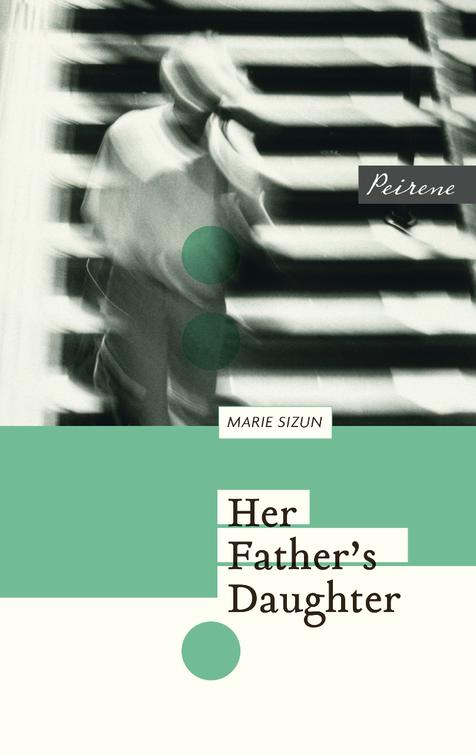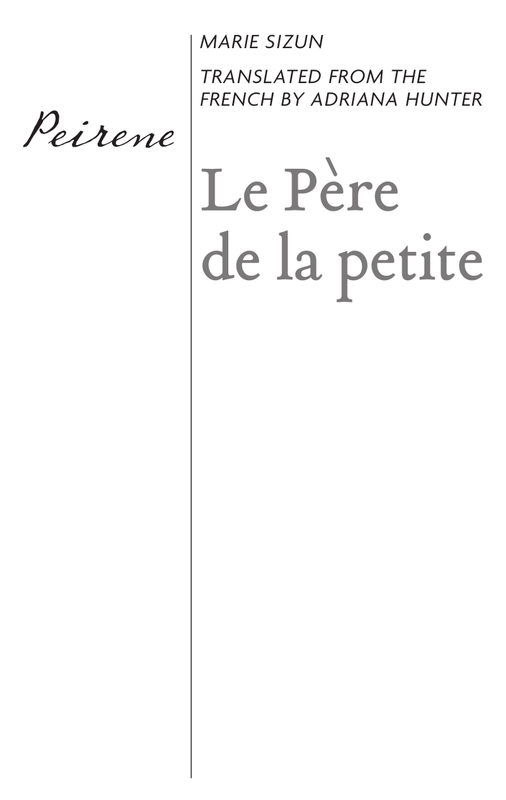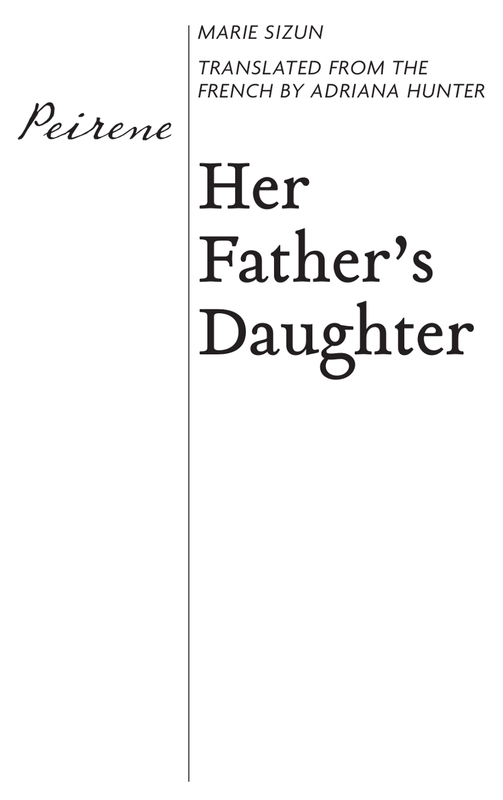Her Father's Daughter
Read Her Father's Daughter Online
Authors: Marie Sizun



Â
MEIKE ZIERVOGEL PEIRENE PRESS
Â
This is a poetic story about a girl's love for her father. Told from the girl's perspective, but with the clarity of an adult's mind, we experience her desire to be noticed by the first man in her life. A rare examination of the bonds and boundaries between father and daughter.

Â
Â
It's a winter's afternoon in the kitchen of the apartment. They're both there, the mother standing doing her ironing, a tall figure, and beside her the little girl, sitting in her special child's chair. They're not talking at the moment. The child is thinking about what her mother has just said. On the radio a few minutes ago there was some news, news about the war, as usual. When the announcement ended, her mother switched off the radio and, still ironing, said something like âYour poor little daddy'⦠or perhaps âWhen your poor little daddy comes home'⦠Offhand. Just like that.
Yes, those were the words she used, not really said to the child, no, but more as if she were talking to herself, pressing the iron slightly more firmly onto the damp linen, and it made the hissing sound swathed in steam that always delights the child. She would normally be enjoying this peaceful moment spent with her mother, in the small kitchen warmed by the heat of her ironing. But right there, in what her mother said, in those words, something loomed before her, something quite new.
Something intruded into the intimate, familiar world of the kitchen. Something the child perceives as a threat.
When. Comes home.
Behind her, on the end of the shelf, stands the old black radio, and just before her mother turned the knob it was from here that the peculiar man's voice spoke, sounding solemn and metallic, so different from the soft, lilting, almost whispered voice of the child's mother. The voice of spoken news. The child knows it. The voice that talks about the war. The child understands. Her mother has explained. Has told her she has a father who's fighting this war. Or rather he's a prisoner, somewhere far, far away. A father she's never seen, except in photos.
One thing she doesn't understand is that her mother always refers to him as
your little daddy.
But the man she's seen in photographs looks quite tall, he looks a bit like the man at the dairy, or the pork butcher, a bit younger perhaps, not so ugly. Her mother sometimes cries when she talks about him, especially recently. The child doesn't like that. She loathes these tears that give her mother a red nose, puffy eyes and a twisted mouth.
This time her mother didn't cry. She simply looked back down at her ironing, with a big lock of hair hiding her eyes and her mouth, as she said quietly, âWhen your little daddy comes home.' Or was it âWhen he comes backâ¦'?
Then the child suddenly asks, âIs he coming back? Why?'
âWhy?'
The mother's eyes alight on the child, her expression filled with astonishment and something not unlike pain, and the child gauges all the oddness of that expression. Her mother has carried on ironing and is no longer looking at the child as she says, âWell, because the war's going to end, my darling. You heard what they said on the radio. All the prisoners are coming home, and your father along with them.'
That's all. The child and her mother fall silent.
Â
There's a big black fly crawling slowly over the yellow and white tiles of the kitchen floor. The child stares, watching its progress. The only thing she can see now is this fly. This big black fly. Nothing but this fly.
âWhen?' the child asks eventually.
âThey don't know. The Germans are already leaving. Soon, probably. Very soon.'
Silence again. The mother and child don't look at each other, each lost in her own thoughts. They're surrounded once again by the warmth of the kitchen, of their familiar world, where everything seems to be in its proper place, the small green cast-iron oven perched on its cabriole-legged stand, the yellow diamonds of the tiled floor, the huge dark stone sink where they wash themselves and the dishes, the shelves and the radio with its curved corners, and the pine table where they have their meals.
The child can't imagine how a man like the butcher or the dairyman could barge in on this, in this very
kitchen, in this life of theirs, the life of this mother and her child, this particular life.
âThere isn't room here,' she says.
The mother gives her that funny look again, slow, unreadable, secret.
âDon't be silly, my darling, there's plenty of room. We lived here all right before you were born, and we were very happy.'
And yet, as she says these words, happy is the last thing the mother seems to be.
Â
The child doesn't say anything else. It feels to her as if all of a sudden, mysteriously, the world has changed.
Â
Â
She's called France, the child is, France like the country. But no one remembers that now. No one ever calls her by that name, even though it was chosen, duty-bound by the war. They just call her âthe child', that's enough. As for calling her name to summon her, to make her come back, that never happens: the child is always there, close by, under her mother's feet, or consumed with waiting for her. Sometimes, though, her mother gently calls her âdarling', âmy darling', and it's not a summons but a tender form of address. She doesn't pronounce her actual name. Doesn't use it. It's only on paper.
France. Like the country. This name she was given must be something her father decided, with a hint of patriotism, when he was setting off to war. The mother agreed to it, at the time. Now she's forgotten. Doesn't really like the name. So it's a name that doesn't exist. France doesn't exist. The child is quite simply the child. Her mother's child. For now it works. She's only four and a half.
Â
Â
Of the outside world, the child still knows pretty much nothing. And very little about this war going on around them, her and her mother, so intimately and yet so mysteriously, this war which is detaining a father she's never met, this distant and apparently dreadful war. All the child knows of the war is the incomprehensible iron-like voice talking about it on the radio. The opaque comments her mother sometimes makes about it. That's all.
The war, as far as the child is concerned, her personal war, the one she knows, is the shriek of air-raid warnings over Paris, the piercing siren sounds, their sad wails that make everyone scurry for shelter in the Métro and then, deep underground, they stay and wait, until another siren tells them to go home. The war is the sudden emptiness of the next-door apartment, the absence of the Lévys, whose children used to play with her. Led away one morning by shouting policemen. Because of the war, is all her mother said. And it's frightening now walking past that mute doorway. The war is also the strange blue-black paint daubed over all the windows in the
stairwell, so the planes dropping bombs can't see our lights at night, apparently. That bluish half-light on the stairs fills your head with dreams and fears.
The restrictions, the ration tickets for food, the queues outside shops, all the things discussed by grown-ups, by women in their building talking among themselves, that's the war too, the child knows it is, but it doesn't really affect her. In fact she loves it when gas and electricity cuts sometimes mean her mother has to cook on a spirit stove which she painstakingly sets up on their little balcony.
And also the war means having those people dotted about the streets, those disturbing, booted characters dressed in dark green, people you have to hurry past, my darling, her mother says, and not say a word. They're frightening and yet, or perhaps precisely because they are, the child thinks they're beautiful.
Lastly, the war was those funny letters on shiny paper, folded into envelope shapes and covered with a filigree of different postmarks in green, red and black, letters her mother received from the prison camp. Before. Letters from her husband. There haven't been any for a long time.
Â
She's never left Paris, the child hasn't, except for once, about a year earlier, when she was three, for a holiday in Normandy with her mother and her grandmother: there was nothing left to eat in the city so, because of the child, we just had to leave, her mother says when she mentions the trip to neighbours. For a few months they lived in an old house on the banks of the Seine, a house
surrounded by a garden, which the child remembers with a sense of wonderment loaded with mystery. She can still picture the splash of colour of a red-flowered plant, fuchsias, her mother said; she recalls the smell of leaves and branches being burned outside, the crackle of the flames; she remembers the peppery smell of washing being boiled on a stove in the garden; the creak of a pump with a handle that you cranked to produce a bubbling gush of sparkling water. She remembers other things too, strange things, but she's been told she was dreaming, and her mother and grandmother have forbidden her to talk about them, to
talk nonsense
.
Â
Of Paris, the child knows only the streets and shops in her neighbourhood. The rue Amelot. The shops on the rue de Bretagne. She almost always goes with her mother to do the shopping. At least for food shopping. She also knows the square where her mother goes and sits on a bench to read or chat to people while she, the child, pretends to play in the sandpit. She hates the place, the sand, how aggressive the other children are, her mother's gossipy conversations.
What she knows well, what she likes, is the apartment, their apartment, her mother's and hers, those two rooms and that kitchen, where they've always lived, she and her mother. Their home.
In one room there's a double bed, which belonged to her parents. Her mother sleeps in it alone now, and has done for five years; the child's bed is in the other room,
which is actually a dining room, one they use when anyone comes: and that means her grandmother, because there aren't really any other visitors. The grandmother is a seamstress. She used to have a little shop that did quite well before the war. Now she has almost no work at all. So she comes over nearly every day to help her daughter with the housework and the cooking. Sometimes she minds the child if the mother goes out. But she's never lived with them â except during that time in Normandy; she lives in another part of the city, a long way away, near Alésia Métro station. The child and her mother never go there, to the dismal little house on the rue Bezout. A house that matches the grandmother. The child doesn't much like this grey, self-effacing woman who only pretends to be strict. The child and her mother find her boring. The child and her mother love nothing more than having fun. Laughing together. Even if sometimes the mother is overcome with sadness and cries in that terrifying way or, and this is worse, stops talking altogether. Is suddenly reduced to stubborn, incomprehensible silence.
Â
The child's real universe, her entire world and the only imaginable world, is her mother.
Of her mother, the child knows everything â or believes she does. She knows her morning face and her evening face, the smell of her skin and of her hair, how gentle her hands are, how warm her breasts, how soft her tummy. She can identify the different intonations of her voice when she's sad, when she's cheerful, when she's singing
or when she's telling stories, or when she chatters about things the child doesn't always understand.
Her mother is beautiful. With an obvious enough beauty for people to turn and look at her in the street. And the child is fascinated by the power of this beauty.
She recognizes by touch, by sight and by smell the short mop of the thick, curly black hair around her mother's face, a face which is always rather pale, its pallor broken by the dazzling red of her lipsticked mouth and the dark agile gleam in her eyes.
She knows and loves, with such a love, the great warm body against which she can snuggle at any time of day. She loves every one of the dresses, even the plainest, that her mother wears, their textures, their smells. She loves her shoes. She loves the way she walks. The way she moves her hands. Her voice. Everything.
She particularly loves the moment every morning when her mother stands in front of the open wardrobe in her slip and asks, âTell me, my darling. What can I wear today? What would you advise?'
And the child, earnestly, makes her choice. The mother, almost always, complies. So the child feels she has partly created her mother; that she belongs to her all the more, to her, the child.
Â
And yet something else the child knows about her mother is her absence. The distress this absence produces in her. Sometimes the mother disappears. Goes out. She goes shopping in town. Take me with you, please, says the
child. No, that's not possible, don't be silly, I'll be back soon. The child sobs, screams, suffocates, penned in by the bars of her cot when she was younger. The mother has already walked away, intransigent. She has left an old handbag full of small objects in the cot, to keep the child occupied.
Left alone, the child calms down, empties the contents of the bag onto the bedspread and then studies each item at length and in detail: a tube of lipstick, a notebook, a pencil, a bracelet, a hankie, all things that refer back to her mother, that tell stories. Eventually â much, much later, it seems to her â she hears the sound of a key in the lock: her mother is home. The child is so bursting with happiness that her voice is strangulated as she calls, as she cries out, in her frantic longing to see her mother, straight away, quicker, now. The mother laughs. Shush now, shush, she says, putting her hat and bag down on a sideboard, you dotty little thing! I can't hear myself think in here now!
What the child hears is life coming back, the movement, music and fragrance of life coming home.
The child is lifted out of her prison bed: she's on her mother's lap, she's reunited with her mother's smell and her warmth, she'd like to become a part of the mother's body, to hold her so close and so hard that she can never go away again. Ever.
Â
And it's this secret, intimate world, their world for just the two of them, that the child can suddenly feel slipping away.
